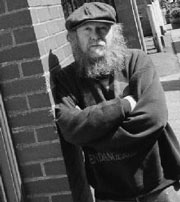THERE ARE AROUND 60 million Catholics in the United States, making it the single largest religious denomination in the country. The revelations concerning sexual crimes by priests—and the response by the church’s hierarchy coming out of Boston, New York, and now Seattle—have resulted in serious soul searching by the practicing Catholics who Seattle Weekly spoke to this week. Here is some of what they had to say.
Joe Martin, 51, is a social worker, musician, and activist and a member of Saint Therese’s Parish.
Like each of the Catholics interviewed, Martin, while deeply troubled by the sex abuse scandal, did not feel his faith in God threatened. “I’m a churchgoing Catholic. Some of my best friends are priests, but a part of my faith is very personal. It doesn’t depend on the priest. I have my own personal relationship with God.”
Martin’s feeling toward the priesthood has not changed either. “I’m willing to give most priests the benefit of the doubt.” He feels that the evil committed by individual priests, while terrible in and of itself, was not in the end surprising. “The president of the United States is doing horrible things. People all over Seattle are doing horrible things.” In the midst of our interview, Martin turned his attention to a Sikh cab driver who was still recovering from an unprovoked beating he received in the wake of Sept. 11.
Martin focused his energy on the failure of the church hierarchy to respond properly to the accusations against priests. “It upsets me that the institution I am a part of, that has many wonderful people affiliated with it, hasn’t dealt with this better. I would like the institution to develop a conversation that incorporates the concerns of people beyond the cardinals. Informed Catholics who represent another point of view need to be brought into the conversation. My concern is that Catholicism as a church and a community will open itself to potential for spiritual revolution; that this [crisis] will be a step toward that—a reflection of the more fundamental positive change. “
Martin, however, is not expecting immediate radical change. “The church is a big institution that moves very slowly.”
Vanessa Veselka, 33, is a union organizer and musician who worships at Saint James Cathedral.
“It does not shake my faith,” she asserts. ” I never believed that priests were special.” Veselka says, “Sex abuse is an epidemic in our country. Sex abuse by parents, teachers, and relatives [of the victims] is huge. Sex abuse runs in families. I almost don’t know anybody who wasn’t abused at some level. What gets people going about the priesthood is the hypocrisy.”
She feels a responsibility as a Catholic to help forge a solution. “It’s not enough to just say, ‘We live in an imperfect world,’ and lift your eyes skyward. You are an active citizen. It is incumbent upon members of the Catholic Church to hold the priesthood accountable.
“Where I go [to Mass] they have been talking about it really openly. Father Michael Ryan has been asking: How do we hold people accountable? As they dig deeper, they’ll find more [abuse]. If they knocked on doors in any neighborhood, they’d find more.
“If the abuse occurred in my parish, I would try to put a lot of pressure on the bishop before I left the parish.”
Walter Bale, 22, attends the University of Washington and the Newman Center Campus Catholic Church.
“As a student and a Catholic, it saddens me. What gives me hope is that the church will learn from our errors. The church needs to learn from the human errors that even the clergy makes. The church has a great opportunity to grow. We have a huge past of errors. We need to say straight up that we’d like to correct our mistakes. We can rebuild trust in the institution. One of the hardest things is to admit when we’ve done things wrong. What we are drawn together for [as a community of worship] is to recognize that.
“The idea is to work together and challenge one another to live life in God’s image. Our goal is to follow Christ. As a member of the church, I hold others accountable, as I would have myself held accountable.
“It’s been something as a community that is hard to handle. Here on campus, as students, we believe that as members of the church and as the future of the church, we strive to learn from it. I am very thankful this is being so publicized.”
At the same time, Bale doesn’t want the scandals to create the wrong impression of the church. “Our priests [at the Newman Center] do great work. It’s a very small percentage [of priests nationwide who are involved in sexual misconduct]. I would hate for it to send out a perception that’s how everything is in the church.”
Dan Moriarty, 31, is a lay social justice minister who receives the sacraments at Saint Ignatius Chapel at Seattle University.
“The sacrament is still valid regardless of the moral status of the priest. God is the one granting us grace, not the priest. People recognize the difference between their relationship to God and their relationship to the church. It’s a common misunderstanding that Catholics don’t have a direct relationship to God. All the Catholics I know, their faith is indirectly affected [by the scandals], not directly affected.”
“The people I’ve spoken with have been more concerned about the outward image of the church. They are angry at the leaders who have made bad decisions, but their bigger concern is they don’t feel this should be a black mark on the Catholic Church as a whole. Very few [priests] are pedophiles; pedophilia is not caused by celibacy.”
The scandal “points to a myriad of issues around sexuality, celibacy, and power in the church. It’s not just for the church hierarchy but for the world to deal with. Ultimately, this is a justice issue.”








